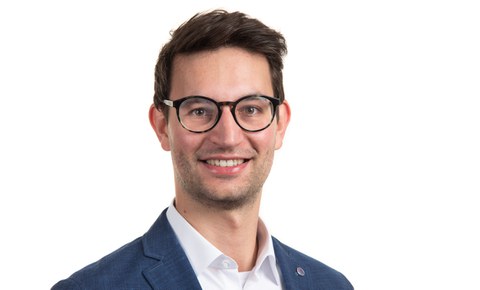May 22, 2024
Prize for outstanding doctorate in systems medicine goes to TUD researcher Simon Syga
Dr. Simon Syga has been honored with the 2024 MTZ®-Award for Systems Medicine for his mathematical modeling of tumors.
“A tumor is a complex ecosystem of many different cell types that interact with each other and gain new functions over time, such as resistance to treatment. A deeper understanding of this system could lead to improved cancer therapies,” this is how Dr. Simon Syga, a member of staff at the Center for Interdisciplinary Digital Science (CIDS) at TU Dresden, outlines the motivation behind his research.
Since 2018, Simon Syga has been conducting research at the Center for Information Services and High Performance Computing (ZIH), a division of CIDS, in the Department of Innovative Methods of Computing (IMC). For his dissertation on the effects of genetic and phenotypical heterogeneity on tumor evolution, the mathematician received the prestigious MTZ® Award for Systems Medicine at the Conference on Systems Biology of Mammalian Cells (SBMC) in Leipzig in May 2024.
As patron of the MTZ®-Award, Federal Minister of Education and Research Bettina Stark-Watzinger emphasized the relevance of research in this field:
“There are still so many interrelationships to be explored: from the complex factors that influence disease, such as genetics or the environment, to tailored approaches to diagnosis, prevention and treatment – just think of cancer, diabetes or heart attacks. Being able to analyze large amounts of data and combine results is a great help. This makes systems medicine, as a comparatively young discipline, a great opportunity for a healthy life well into old age.”
Approach to the work – contribution to cancer research
In his dissertation, Simon Syga developed an innovative mathematical method to better understand tumor development. Tumors consist of many cell types that differ in terms of genetics and their behavior (phenotype). This influences their growth and their response to therapies, explaining why specialists often speak of tumor heterogeneity. Syga has developed a new mathematical model that takes the individual properties of the cells into account and simulates them in a realistic fashion. With this model, Syga was able to show that tumors develop differently in different environments – and how this development influences the growth and spread of the tumor. These findings could help develop new approaches to cancer treatment.
“It’s extremely difficult to observe these microscopic processes, which are crucial for the development of tumors, over long periods of time. Mathematical models, like the one I developed, make it possible to test biological hypotheses, simulate relevant scenarios, and then optimize cancer treatments,” explains Syga.
Based on his dissertation, Dr. Syga and his co-authors are investigating the interaction of irreversible genetic tumor cell changes and reversible non-genetic tumor cell changes in a current publication [link bioRxiv, see below] (under review). This interaction leads to patterns of tumor heterogeneity that could be used to better assess the chances of success of cancer therapies.
Modelling biological systems at ZIH
For many years, the IMC department at ZIH has been working on the modelling of dynamic biological processes in cells, tissues and organs in numerous international collaborations and projects. This international network includes close collaboration with Prof. Peter Friedl and his world-leading tumor research group at the Radboud University Nijmegen in the Netherlands. Following Dr. Simon Syga's doctorate, the collaboration was continued as part of a project funded by the European Research Council (ERC Advanced Grant subLETHAL) to develop novel cancer treatments.
About the BMBF’s MTZ®-Award for Systems Medicine
In close collaboration with the Federal Ministry of Education and Research (BMBF) and Project Management Jülich, the MTZ®Foundation's national prize for young talent is awarded every two years to honor outstanding dissertations in the field of systems-oriented health research. The 2024 MTZ®-Award for Systems Medicine supports early-career researchers working in STEM fields and promotes interdisciplinary work between biomedical research and computer modelling.
“Systems biology is the fundamental research needed to develop (systems) medicine that uses AI in clinical applications to combat diseases on an individualized basis,” is how the MTT®Foundation's website summarizes its mission.
After excellent dissertations were honored with the MTZ Award for Medical Systems Biology from 2008 to 2020, the MTZ®-Award for Systems Medicine will now be presented for the second time under its new name in 2024.
More information: https://www.mtzstiftung.de/stiftung/mtzfoundation/mtz-foundation-award/
Relevant links to be added to the text
- https://tu-dresden.de/zih/forschung/projekte/sublethal
- Link to dissertation: https://tud.qucosa.de/api/qucosa%3A89825/attachment/ATT-0/825/attachment/ATT-0/cosa%3A89825/attachment/ATT-0/
- Link to current work (under review): https://www.biorxiv.org/content/10.1101/2024.03.18.585460
- Link to ZIH core research areas: https://tu-dresden.de/zih/forschung/life_sciences
Contact:
Dr. Simon Syga
Center for Information Services and High-Performance Computing (ZIH)
Tel.: +49 351 463-38779

